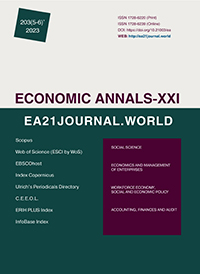International scientific collaboration in the research system: dynamics, opportunities and challenges for Kazakhstan
International scientific collaboration in the research system: dynamics, opportunities and challenges for Kazakhstan
Author(s): Adilbek Bisenbaev, Maira Sapieva, Oraltay Zholymbayev, Marzhan GalimzhanovaSubject(s): Sociology, Methodology and research technology, Socio-Economic Research
Published by: Institute of Society Transformation
Keywords: International Collaboration; Cooperation; Commensalism; Joint Publications; Citation; Correlation Coefficient; Science Diplomacy; Dynamics;
Summary/Abstract: Introduction. International scientific collaboration and science diplomacy are essential components of international relations and international law, facilitating cross-cultural interactions at various political, societal, social, humanitarian, and technical levels. The sphere of international scientific collaboration, increasingly intertwined with science diplomacy, holds significant relevance in the realm of global relations and international jurisprudence. It fosters multifaceted exchanges spanning political, societal, humanitarian, and technical domains. In the current epoch, often termed the «International Era,» the dynamics of international scientific collaboration assume heightened importance. This era marks a distinct phase in the evolutionary trajectory of global science, progressing from individual, institutional, to national stages. Methodology. This study delves into the nature and scope of international scientific cooperation involving Kazakhstani scientific entities and researchers. It employs an analytical framework grounded in epistemology and gnoseology, complemented by statistical and correlational analysis. The investigation categorizes the diverse forms and types of international scientific engagements, adopting a synectics approach. It introduces the concept of «commensalism» as a contemporary model of international collaboration in the Kazakhstani scientific context. The paper confronts challenges associated with the saturation of information in scientific publications and introduces the notion of the «dark matter of science.» It proposes hypotheses on the structures, targeted outcomes, and methodologies pertinent to international scientific cooperation. The research employs scientometric data, exemplified through national and academic research scenarios, to establish correlations. It interprets Pearson, Spearman, and Kendall correlation coefficients within the context of scientometric parameters, focusing on publication activities in international scientific collaboration. Results. The study unveils critical insights into the dynamics of international scientific collaboration and its economic implications. Key findings include a positive correlation between the number of joint publications and the H-index across various research fields, with notable variations in research funding and commercialization potential. Engineering, Physics & Astronomy, and Medical Sciences emerge as leading disciplines in terms of joint publication volume, H-index, and economic parameters. In contrast, Social Sciences show a lower level of international collaboration and economic impact, suggesting a more localized research focus. The data also highlights significant economic viability in fields like Materials Science and Environmental Sciences, driven by global emphasis on sustainability and technological advancements. Scientific Novelty. The novelty of this research lies in its comprehensive analysis of the economic aspects of international scientific collaboration, especially in the context of Kazakhstani research. It bridges the gap in understanding how international collaboration, especially with scientifically advanced countries, impacts not only academic metrics like the H-index but also economic factors such as research funding and commercialization. This study is one of the first to quantitatively analyze these aspects in the Kazakhstani research context, offering a new perspective on the economic benefits and challenges of global scientific partnerships. Practical Significance. This research holds significant practical implications for policy-makers, researchers, and academic institutions in Kazakhstan. By identifying the fields with the highest economic benefits from international collaboration, it provides a strategic roadmap for allocating resources and prioritizing research areas. The findings can guide policy decisions to enhance Kazakhstan’s integration into the global research community, optimize research funding allocation, and harness the commercial potential of scientific advancements. Additionally, it offers insights for individual researchers to strategically collaborate internationally for maximizing their academic impact and economic benefits.
Journal: Економічний часопис - ХХІ
- Issue Year: 203/2023
- Issue No: 05+06
- Page Range: 4-15
- Page Count: 12
- Language: English

